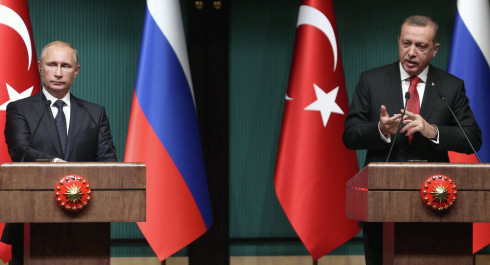Russia will strengthen control over food supplies from Turkey. There are suggestions of freezing all of the economic deals between the two countries. The suspension of Turkish building projects in Russia, and the end of trade liberalization negotiations.

After the incident with the downed Russian jet, expectedly, we are witnessing a change in the relationships between Russia and Turkey.
On Thursday, Russia announced that the country will work on sanctions against Turkey.
Russian Prime Minister Dmitry Medvedev ordered the government to work out economic measures which may include the suspension of joint economic projects, restrictions in trade and financial operations, the revision of trade tariffs as well as restrictions in tourism, aerial and maritime communication.
The country announced that it will strengthen control over the food supplies from Turkey and will perform additional border, and production checks. This was said by the Ministry of Agriculture on Thursday. The argument presented by Russia in terms of these measurements is the repeated violation of Russian standards by Turkish producers.
“About 15% of Turkish agricultural products on average do not meet Russian standards,” Minister of Agriculture Alexander Tkachev said. According to the Russian Ministry of Agriculture, Russia imported foods and agricultural products from Turkey in the amount of $1.7 bln in 2014 which is 4,3% of the total Russian food import. At the same time, Russian export of foods and agricultural products to Turkey rose by a third in 2014 and totaled $2.4 bln. According to Morgan Stanley, the Russian economy will not be damaged by the food ban, and Turkey will be easily replaced as a food supplier to the Russian market.
Also, the sanctions are expected to cause construction companies from Turkey to leave but the Russian Minister of Construction Industry Mikhail Men, said that the Russian market will not be seriously hit if Turkish developers leave, as Russian companies are ready to replace them. Just for 2013, Turkish construction firms had projects in Russia for a total of $5.7 billion. According to Ulyukayev Russia will not go through any difficulties with these sanctions since the government will do everything to compensate them.
Within its sanction package Russia may also use the WTO rules which is enshrined in Article XXI of the General Agreement on Tariffs and Trade. According to this, a country can restrict its partnership with a country if its national security is under threat.
Another thing that can be taken under consideration when making the sanctions in the Akkuyu Nuclear Power Plant which is currently being built by the Russia’s Rosatom Company in the southern province of Mersin. The total amount of the project is estimated to be $22 billion and currently $3 billion have been sent. The contract was signed in 2010, and the construction was scheduled to begin in June but was postponed due to formal agreements issues. The start of the pipeline building was expected to begin no earlier that December 2015. According to Russia’s Economic Development Minister Andrei Ulyukayev, the pipeline will be part of the sanctions that will be imposed on Turkey.
Energy cooperation between the two countries is the most significant field of their relationship. In 2014, Russia’s gas- producing giant Gazprom exported 23,7 billion cubic meters of gas, which amounts to 5,3% of its overall output. Moreover, Turkey buys Russian- produces crude oil and coal.
This comes after Lavrov recommended Russian citizens not to go in Turkey, which resulted in canceling tours to Turkey from Russia. What is more, Russia’s State Duma’s International Affairs Committee deputy head Leonid Kalashnikov on Tuesday proposed that Russia halts diplomatic relations with Turkey following the downing of the Russian Su-24 warplane in Syria.
“We should immediately freeze economic relations with Turkey, diplomatic ties may be halted as well,” Kalashnikov told TASS.
Sergei Lavrov also announced during press conference with Walid Muallem, that Moscow will suspend the visa-free egime with Turkey after January 1, 2016.
“The Russian government reached a decision to suspend the free-visa regime between Russia and the Turkish Republic. The decision will come into effect on January 1 2016’’
The Russian minister added that threats coming from Turkey were “not artificial.”
“On the contrary, these threats are very real, and we are saying this with full responsibility,”
The Su-24 frontline bomber of the Russian aviation group in Syria crashed in the Syrian territory on Tuesday. Russian President Vladimir Putin said that the plane was downed by an air-to-air missile launched by a Turkish F-16 fighter.
According to the Russian president, at the moment of the attack the Russian Su-24 plane was flying at an altitude of 6,000 meters at a distance of one kilometer from the Turkish border and posed no threat to Turkey. Putin called the incident a “stab in the back” of Russia delivered by “terrorism accomplices.”
Indeed, Turkey is one of Russia’s biggest trade partners and sanctions with such character will inevitably affect both of the economies. And whatever Ankara would claim, it’s beyond its capability to compete with Moscow. Russia not only can hit the Turkish economy hard, but also put an end upon Turkish dreams of becoming a leading power in the Middle East region.
Written by Yoana for South Front



